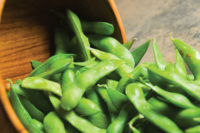Mustard May Help Broccoli Fight Cancer
January 29/Champaign, Ill./The Express -- Eating broccoli with mustard can boost the vegetable's cancer-fighting ability, scientists have found, and adding radishes, rocket or wasabi, a form of Japanese horseradish, can have the same effect.
However, overcooking the broccoli can kill the vital enzyme it contains. Steaming it quickly for just two to four minutes is the best way to preserve its well-known health benefits, say U.S. scientists.
Elizabeth Jeffery, a professor of nutrition at the University of Illinois, said, "Broccoli, prepared correctly, is an extremely potent cancer-fighting agent. Three to five servings a week are enough to have an effect."
An enzyme called myrosinase must be present for sulforaphane, broccoli's cancer-preventing component, to form in the vegetable.
Broccoli sprouts, which are young plants just three to four days old, contain myrosinase in abundance.
Researchers found that myrosinase from the young sprouts enhances the levels of sulforaphane formed and absorbed from the broccoli when the two are eaten together.
Eating broccoli with mustard, radishes, rocket or wasabi can boost its benefits further.
Jeffery said, "To get broccoli's benefits, the enzyme myrosinase has to be present. If it's not there, sulforaphane, broccoli's cancer-preventive and anti-inflammatory component, doesn't form."
She said foods containing sulforaphane which can be teamed with broccoli to boost its benefits are mustard, radishes, rocket and wasabi.
She added, "To increase the vegetable's benefits, you could sprinkle broccoli sprouts on your broccoli or make a mustard sauce.
"People who prefer to eat broccoli without sauce or sprouts should know that overcooking is the kiss of death for the important enzyme myrosinase.
"Steaming broccoli for two to four minutes is the perfect way to protect both the enzyme and the vegetable's nutrients." The compound sulforaphane has already been shown to block genetic glitches that trigger prostate and breast cancer.
Chemicals found in broccoli, cauliflower and cabbage have been found to enhance DNA repair in cells, helping to stop them becoming cancerous. The latest study is published in the journal Nutrition and Cancer.
From the February 7, 2011, Prepared Foods E-dition
Looking for a reprint of this article?
From high-res PDFs to custom plaques, order your copy today!




